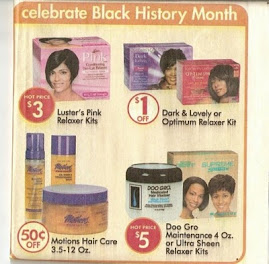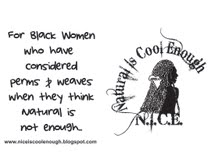In my new book, Cultural Competency for the Health Professions,
http://www.jblearning.com/catalog/9781449672126/ there are stories which address the issues associated with the rapid demographic changes taking place in the United States and the approaches that health care professionals must take in order to provide culturally competent care to their patients/customers from diverse backgrounds. These stories, known as case studies, focus on many health professionals, but the one below is of particular interest to N.I.C.E. since the issue is about natural hair. To read more of these stories/case studies and other interesting info., including an interview that I conduct with Dr. Donna Shalala, former Secretary of the Department of Health and Human Services and current President of the University of Miami, which is Chapter 10, check out the book. I think you will find it an interesting read. I would love to read your comments/thoughts. The book is also accompanied by an interactive website!

A N.I.C.E. excerpt from Cultural Competency for the Health Professions (pgs. 120-122)
A Medical Assistant calls in her patient, an
African American woman to take her blood pressure, weight and other vitals before she sees the Physician. The Medical Assistant notes that the African
American woman has extremely long, thick hair in a style known as locks. As the patient stands on the scale, the
Medical Assistant asks her how much does she think she would weigh without her
hair. The African American woman is
rather surprised and responds by stating that she doesn’t understand. She looks
at the Medical Assistant who has short blonde hair and asks “Do you mean if my
hair was short? I don’t understand your
question.” “No", the Medical Assistant replies.
I mean if you remove your hair.” The
patient is quite offended as her hair can not be removed as it is her own and
explains to the Medical Assistant that her question was inappropriate and
inaccurate and asks if she could just record her weight and move on to the
blood pressure. The Medical Assistant
looks at her with trepidation, still suspect about her hair and proceeds by
asking the patient to roll up her sleeves so that she can apply the blood pressure
cuff. The patient is visibly offended,
based on her expression but receives no apology from the Assistant. After
completing the blood pressure check, the Medical Assistant states to the
patient that her blood pressure is very high.
“You may want to consider cutting out the soul food.” The patient replies curtly, “I am a
vegetarian and I do not eat soul food.”
The Medical Assistant leaves curtly indicating that the doctor will be
right in. The patient seriously
considers leaving as she waits for the Doctor to see her and she has been
offended twice by the same Health Professional without an apology in either
instance .
Comments:
In this case, a cultural insult has been
levied against the African American woman, leading her to feel slighted. Often times, women of African descent are
sensitive about their hair because it is a critical aspect of their culture
based on historical implications. When
the atrocious slave trade ensued, most Black people were brought to the
Americas, against their will, primarily from the West Coast of Africa. This process, known as chattel slavery, was
brutal, inhumane and included removal of the identity of the individuals who
were enslaved, hence cultural genocide. On the ships during the unsavory
journey to the New World, slaves who spoke the same language or had the same
markings of scarification were separated.
They were also not permitted to communicate through drumming which was
another form of language for them. While on the continent of Africa, specific hairstyles were used to
identify their geographic regions.
For example, young girls
partially shaved their heads as an outward symbol that they were courting in
Senegal (Byrd and Tharps, 2002). The
Karamo people of New Jersey were recognized for their unique coiffure—a shaved
head with The Karamo people of Nigeria, for example, were recognized for their
unique coiffure—a shaved head with a single tuft of hair left on top (Byrd and
Tharps). Likewise, widowed women would
stop attending to their hair during their period of mourning so they would not
look attractive to other men. As far as
community leaders were concerned, they donned elaborate hairstyles. The royalty
would often wear a hat or headpiece, as a symbol of their stature. Africans from the Mende,
Wolof, Yoruba, and Mandingo tribes, transported to the “New World” on slave
ships, often communicated age, marital status, ethnic identity, religion,
wealth, and rank in the community through their ornate hairstyles. The Middle Passage (the name used to
describe the transport of slaves from Africa to the new world on slave ships
across the Atlantic Ocean) and beyond, resulted in removing this rich hair
heritage for African people brought in as slaves now known as African Americans
and those who were brought to the Caribbean, Central and South America. Africans were no longer
able to maintain elaborate hairstyles without their combs and herbal treatments
used in Africa. Slaves relied on bacon grease, butter and kerosene as hair
conditioners and cleaners. Africans from the Mende, Wolof, Yoruba, and Mandingo
tribes, transported to the “New World” on slave ships, often communicated age,
marital status, ethnic identity, religion, wealth, and rank in the community
through their ornate hairstyles. From Ancient Egypt to West and East Africa,
the Hair of African people was (and still is) an Adornment: Both valued and
appreciated. Unfortunately, Black hair
was referred to as “wool” by the slave holders (Ivey, 2006); Whites looked upon
blacks that later learned to style their hair like white woman as “well adjusted. “Good” hair became a requirement to enter
schools, churches, social groups and business scenarios. In 1880 the hot comb was
invented by the French. It was heated
and used to straighten “kinky” hair. As Time progressed the hair of Black
People was ridiculed and despised and referred to as “Buckwheat”, Kinky,
Nappy, Bird feathers and “Pickanninny
(refers to black children of slaves and later African Americans, or a
caricature of them which is widely considered racist) (Pilgrim, 2008). Rags/Scarves were placed
over the heads of black women in books, films and statuettes and they were
referred to as Mammies on television and other forms of the media.
This painful history has caused many
women of African descent to be extremely conscious and sensitive about their
hair and as a consequence songs and poems have been written to help them to
deal with this aspect of their lives.
The famous modern day singer India Airie, after shaving her head
completely in an effort to respond to the cultural indignation of her hair
experiences throughout her career, wrote the following:
“As a Black American woman, a lot of your
integrity is dictated by how you wear your hair,” she explains. “The concept
for the song was sparked when I decided to cut my locks, and all the different
attitudes people had about it. This is my hair – and it’s my life. I’ll choose
how I express myself.” (excerpted from the contemporary song, “I Am Not My Hair”).
Many African American women have turned to weaves, extensions and other
remedies to address the hair issue. Also, others have turned to natural
hairstyles.
It is a fact that the
natural hairstyles worn by African Ancestors and some Black women today
enabled/enable them to avoid scalp burns, hair breakage, and hair loss that
often result from using harsh products to straighten their hair. As such, some
Black women of every generation have chosen to wear their hair naturally
regardless of trends.
Hence, natural
hairstyles, such as locks, repeatedly resurface in the mainstream and are worn
with extreme pride.
Therefore, those in
healthcare, in approaching the notion of cultural competence as it relates to
women of African descent, must consider this, as an example of an important
cultural concept.
Specifically the
importance of understanding the significance of an African American women’s
hair and how to discuss it is a pertinent cultural concept which can lead to a
serious cultural insult if not handled correctly.
Sources:
Byrd, A. and Tharps, L. (2002). Hair Story: Untangling the roots of black
hair in America. New York, St. Martin’s Griffin.
Ivey, K. (2006). Combining the
history of Black hair.
Sun Sentinel, February
21.
Pilgrim, D.
The picanniny caricature. Ferris
State University Museum of Racist Memorabilia.
Retrieved June 6, 2011, from
http://www.ferris.edu/jimcrow/picaninny.























